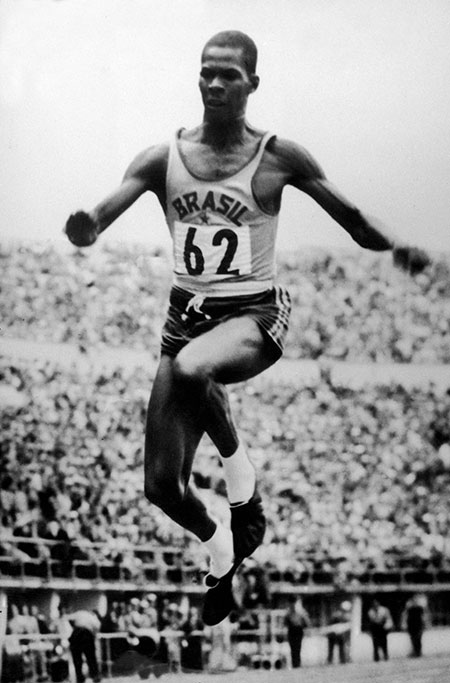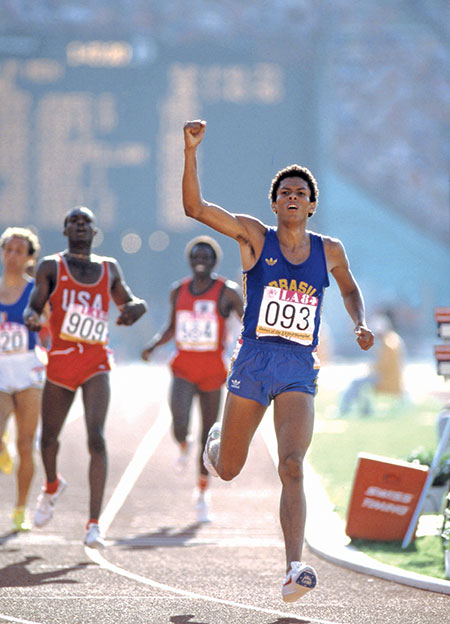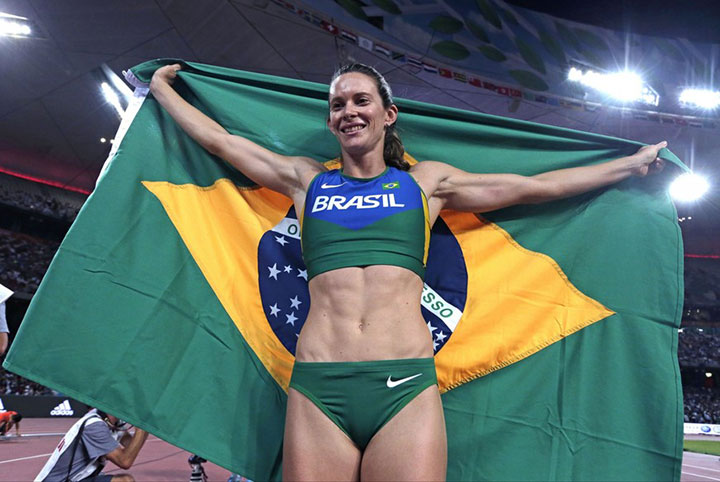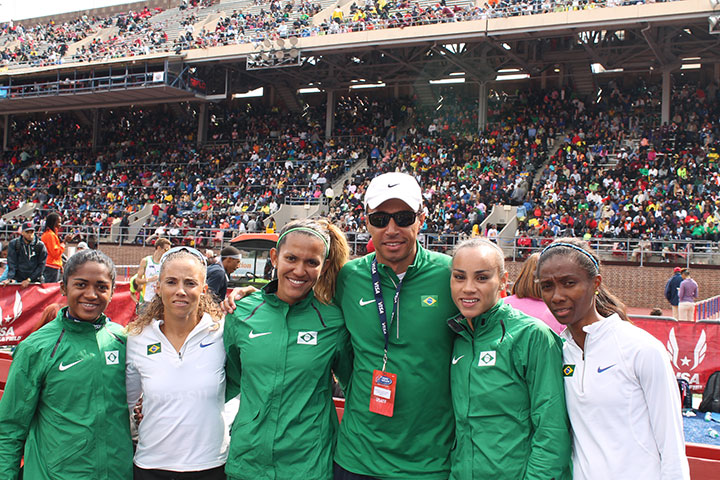|

|
 |
|
Last Updated: Feb 13, 2017 - 1:45:37 AM |

Brazillian Triple Jump Great Adhemar Ferriera Da Silva at 1952 Helsinki Games, photo compliment of Roberta Gesta de Melo
|
Brazil, the world’s fifth largest nation with a population of 204 million has had a great and colorful history of track & field “The Queen of Olympic Sports” dating back to the 1952 Helsinki Olympic Games.
The first set of Brazilian stars were nearly without exception, triple jumpers.
The nation is renowned for its colorful carnival, enticing samba, bossa nova and the music of the renowned Antonio Carlos Jobim, after whom the Rio airport is named.
Two years ago the nation which was colonized by Portugal, hosted the World Cup. With superstar Pele football is a lifestyle there, having won the World Cup five times. Now they are hosting the Olympic Games in Rio de Janero, the first one in South America.
The gigantic statute of Christ the Redeemer overlooks the enchanting city.
We take a brief look at that brilliant history of Brazilian track & field with the Olympic competition starting on Friday.
Adhemar Da Silva
Triple jumper Adhemar Da Silva captured the Triple Jump at the Helsinki Games in 1952. Earning a Silver medal was Jose Telles Da Conceicao in the High Jump. Da Conceicao cleared 1.98m.
Leading up to the Helsinki Games, Da Silva set two world records in his event, jumping 16.00m in Sao Paulo on December 3rd, 1950 and one of 16.01m on September 30th in Rio in 1951.
At the Helsinki Games he jumped a new world record of 16.12m then went on to improve to 16.22m.
In March of 1955 at the Pan American Games in Mexico City Da Silva improved his world record to 16.56m.
At the 1956 Olympic Games in Melbourne Da Silva jumped 16.35m to defend his title.
The dominant triple jumper participated at his final Games in Rome in 1960, finishing fourteenth.
Da Silva took to acting and was called “Black Orpheus”.
Nelson Prudencio
It took another thirteen years after Da Silva’s world record in the Pan Am Games in Mexico City when at the Mexico City Olympic Games in 1968, another Brazilian, this time Nelson Prudencio, set a world record of 17.27m, on the way to a Silver medal. World records were set four times in the event, first by Italian Giuseppe Gentille at 17.22m, then tied by Soviet Viktor Saneyev at 17.22m, then increased to 17.27m by Prudencio. Finally Saneyev jumped 17.39m.
Prudencio made Bronze in Munich in 1972 where he jumped 17.05m.
Joao Carlos de Oliveira
At the Pan Am Games in Mexico City in 1975, Joao Carlos de Oliveira jumped 17.89m for a new world record. A year later at the 1976 Montreal Olympics Oliveira won the Silver medal with a jump of 16.90m. Moscow in 1980 saw him win Bronze with a jump of 17.22m.
Oliveira was the last of the magnificent Brazilian triple jumpers to win an Olympic medal.

Brazilian 800m star Joaquim Cruz shown winning Los Angeles Olympics, courtesy Roberto Gesta de Melo
|
Brilliant half milers Joaquim Cruz, Agberto Guimares, and Jose Luis Barbosa
At the Inaugural IAAF World Championships in Helsinki in 1983 Joaquim Cruz captured the Gold medal in the 800m in 1:44.27. Teammate Agberto Guimares finished in sixth place in 1:45.46.
At the Los Angeles Olympics in 1984 Cruz won in 1:43.00.
Jose Luis Barbosa won the Bronze medal in the 800m at the1987 Rome World Championships in 1:43.76.
Cruz came back in Seoul in 1988 to capture the Silver medal in 1:43.90.
And at the 1991 Tokyo World Championships Barbosa improved to the Silver medal with a 1:44.24 run.
Brilliant Sprinters, Robson Da Silva, Claudinei Da Silva, and Sanderlei Parella
Sprinter Robson Da Silva became the first Brazilian to win a sprint medal in the Olympic Games, a Bronze in the 200m at Seoul in 1988 in 20.04 seconds.
At the 1996 Atlanta Games Da Silva led Brazil to its first world relay medal, a Bronze in the 4x100m relay with Andre Domingos Silva, Arnaldo Da Silva, and Edson Luciano Ribero.
In Athens in 1997 Claudinei Da Silva captured the Bronze medal in the 200m with a 20.26 seconds run.
He improved that to Silver at the Seville World Championships in 1999 with a 20.00 seconds clocking.
Da Silva joined with Raphael De Oliveira, Edson Ribero, and Andre Da Silva in Seville to capture the Bronze medal in the 4x100m relay in 38.05 seconds.
Also in Seville, Sanderlei Parella captured the Silver medal in the 400 in 44.29 seconds for a South American record, behind the World record of 43.18 seconds for Michael Johnson.
At the 2000 Sydney Olympic Games Claudeni was there again, leading his team of Andre Domingos Da Silva, Arnaldo Silva, and Edson Luciano Ribero and Vincena De Lima to the Silver medal. They clocked a national record of 37.90 seconds.
At the 2003 Paris World Championships Brazil grabbed Silver again, this time with Vincent De Lima, Edson Ribero, Andre De Silva, and Claudio De Souza. They clocked 38.26 seconds.
A Rare Marathoner Vanderlei De Lima
Success on the track was not limited to the sprints.
At around one hour and fifty-two minutes Vanderlei De Lima was in the lead of the 2004 Athens Olympic marathon when a protester grabbed him and pushed him into the crowd. De Lima recovered and started running again. He was passed by two men and was still able to capture the Bronze medal in the marathon with a 2:12.11 clocking. De Lima became a hero in Brazil upon his return.
Maureen Higa Maggi
Long Jumper Maureen Higa Maggi jumped 7.04m for the Gold at the 2008 Beijing Olympic Games.
Participation in London
Four years later, 2012 in London Brazil’s best performances were seventh in the Long Jump finals with Mauro Vinicius Da Silva in 8.01m, and seventh in the women’s 4x100m in 42.91 seconds.
Success in Moscow
At the Moscow World Championships in 2013 the team of Evelyn Dos Santos, Ana Claudia Silva, Franciela Krasucki and Rosangela Santos finished second in their heat in a South American record of 42.29 seconds. Unfortunately they did not finish in the final.

Fabiana Murer
|
The New Kid on the Block, Fabiana Murer
Fabiana Murer climbed the pole at the 2011 World Championships in Daegu, South Korea for the Silver medal with a 4.85 m jump.
She has been the most popular Brazilian athlete since then, finishing third globally in 2012 with 4.77m jump, sixth in 2013 with a 4.75 m, first in 2014 with a 4.80 m jump.
Fabiana is the best hope for a hometown medal in Track and Field with the second best performance this year at 4.87 m.
Wagner Domingos
This Hammer thrower has the fourth best performance of the 2016 season with a 78.63 m throw.
Thiago Braz
In the Men’s Pole Vault Thiago Braz has the fourth best globally this year at 5.90 m.
Women’s 4x100m Relay
The Brazilian women’s 4x100m relay has the fifth best performance of 2016. The team ran 42.59 seconds on July 22nd at the London Diamond League meeting.
Host Country Challenges
The football crazy nation was embarrassed by Spain 7-1 in the semi-final game of the 2014 World Cup. They also fell to The Netherlands in the battle for the Bronze medal.
In 2007, the same year they hosted the Pan American Games, Brazil won the bid to host the 2016 Olympic Games.
The nation has experienced severe political, social; and economic challenges, alongside the recent zika outbreak.
Hometown Advantage
At every competition the hometown team usually has a bump in support based upon the support of the local fans.
Looking back at the brilliant history of Brazilian athletics mixed with its crop of current stars, the giant in South American sports looks to have a few successes in athletics at the world’s largest sporting event, the Olympic Games.
Which Brazilian athletes will emerge when athletics competition starts this Friday?
Friday night’s impressive Opening Ceremonies of the Olympic Games made believers of viewers around the world. It was a samba party at the famed Maracana stadium.
IOC President Thomas Bach surprised the audience in the stadium and around the world by presenting famed Kenyan middle distance runner Kipchoge Keino with the newly established the Olympic Laurel award, mainly due to Keino’s educational and humanitarian work.
Brazilian 800m Olympic Champion Joachim Cruz was one of the eight Brazilian celebrities who carried the flag, and famed marathoner Vanderlei De Lima lit the Olympic flame.
We are looking forward to a memorable Games with superb performances in track and field by the hometown and visitors alike.

Brazilian coach Sanderlei Parella with his 4x400m relay team at the 2014 Penn Relays, courtesy of Alpheus Finlayson
|

© Copyright 2016 by thebahamasweekly.com
Top of Page
|
|
 |

|
